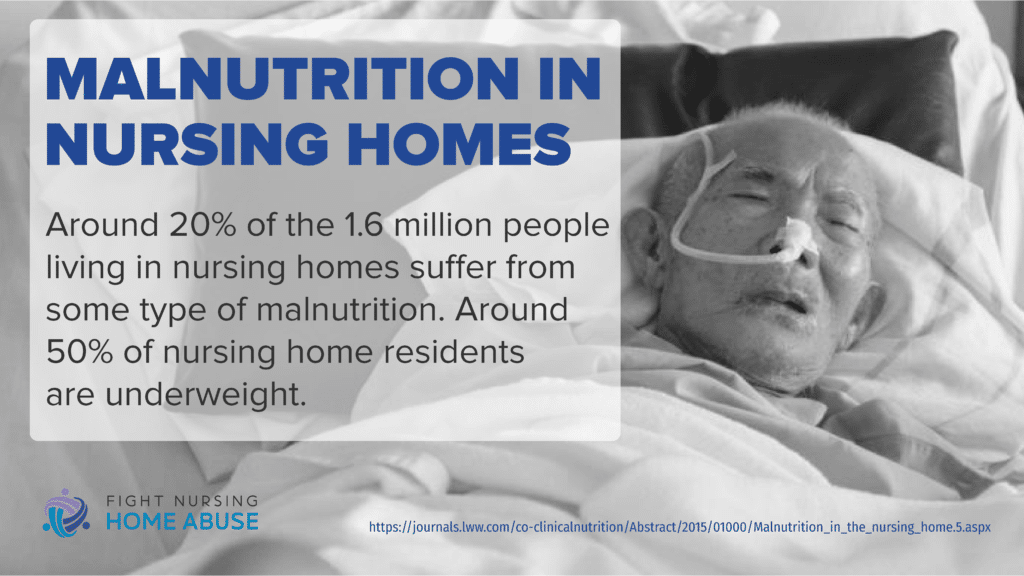Malnutrition

Malnutrition is a leading form of neglect among nursing home residents. It can be defined as,
the condition that results from eating an unbalanced diet that lacks the proper amount of nutrients or has too many of certain kind of nutrients.
Malnutrition can occur when there is lack of food, yet, in typical nursing homes across the United States, lack of nutritious food is usually never the problem.
In many instances, the wrong servings sizes are given out to residents. This will eventually result in malnutrition if these residents aren’t getting the proper nutritional intake. Even when residents receive the correct portions, dental problems may make it difficult for residents to eat certain kinds of foods.
Additionally, elderly people are prone to appetite loss, so it’s especially important for staff members to adequately monitor and help residents during meal time.

What Leads to Malnutrition in Nursing Homes?
There are a variety of factors that contribute to malnutrition in nursing homes. Some of the more common factors include:
Depression
Depression is also a growing concern in nursing homes. At least 30% of all nursing home residents in the United States suffer from some form of depression, which can lead to appetite loss and refusal to eat. Medications can also play a factor in appetite loss as side effects of many prescription-based drugs make people nauseated.
Inability to Feed Themselves
Another reason that elderly people in nursing homes may become malnourished is due to not being able to feed themselves. In these instances, feeding tubes are typically needed in order to ensure the resident is getting adequate nutrition. However, according to the Centers for Medicare and Medicaid Services (CMS), hundreds of nursing homes are cited each year for inappropriate feeding tube insertions and improper feeding methods.
Staffing Shortages
Staffing shortages remain a great concern in nursing homes across the nation. When there is a shortage of staff, not only do needy residents risk malnutrition from neglect, but a host of other problems can occur as well. Additionally, per CMS, an array of nursing homes have been cited for:
- Improperly stored food
- Improperly cooked food
- Serving bland and unappetizing meals
- Serving foods that should be hot at below-average temperatures
Many residents, understandably, will not eat, ruined, cold, and/or bland foods. What’s more – they shouldn’t have to.
What are the Signs of Malnutrition?
If you regularly spend time with your loved one, you will likely notice changes in their appearance or health. However, malnutrition can cause physical changes over time that may impact overall health. Some of the signs of malnutrition to be aware of include:
- Weight Loss
- Fatigue
- Dizziness
- Swollen and/or Bleeding Gums
- Fragile Bones, Muscle Loss, Weakness
- Mental Decline and Memory Loss
- Decreased Organ Function
- Bloated Abdomen
- Dry Skin
- Tooth Decay
- Confusion
If you notice any of these signs of malnutrition, it is important to have your loved one assessed by a doctor. Without adequate reversal of malnutrition, your loved one could experience a variety of detrimental health problems.
Get Help with Suspected Malnutrition
If you suspect that your loved one in a nursing home is malnourished, contact Fight Nursing Home Abuse right away. Our team of nursing home abuse lawyers can help you understand your loved one’s situation and legal rights, and help you ensure they are protected.
Fight Nursing Home Abuse offers a free consultation to every potential client. There’s no obligation to learn more and get the legal support you need. Call us at 866-548-9636, or fill out our online form to get started.


